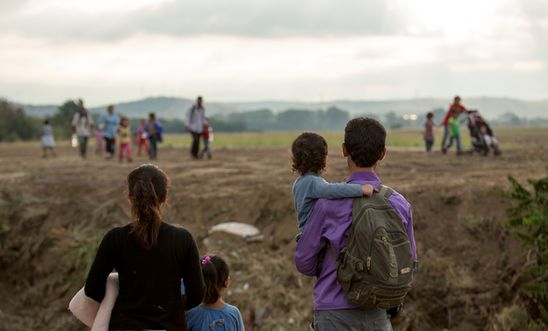
Press releases
Migration figures: government urged to 'show some basic humanity' over global refugee crisis

‘The UK should be doing far more to help people caught up in the worst refugee crisis since the Second World War’ - Steve Symonds
Two-thirds of Eritreans being denied asylum despite rampant human rights abuse in troubled Horn of Africa country
Responding to the publication today of new Office of National Statistics figures on immigration to the United Kingdom, Amnesty International called for the government to allay public fears on the issue and to “show some basic humanity”.
The figures show that there were 25,771 applications for asylum in the UK in the year ending June 2015, compared to 23,515 applications over the period last year. The largest number of asylum applications came from Eritrea (3,568). Applications from Syria (2,204) and Sudan (1,799) were also in the top five, with numbers rising.
Amnesty International UK’s Refugee Programme Director Steve Symonds said:
“What any responsible government needs to do is allay public fears over migrants and refugees, put the numbers into perspective and show some basic humanity.“With Syria in flames and much of the Middle East and parts of Africa in turmoil, the UK should be doing far more to help people caught up in the worst refugee crisis since the Second World War.“Instead of throwing up the barricades or using inflammatory language about highly vulnerable people, UK ministers should be taking up the responsibility of managing this refugee crisis.“European countries like Germany and Sweden are doing far more than the UK to help, while Europe itself is seeing fewer arrivals than many other parts of the world.“We need to see the creation of safe and legal routes for those trying to enter Europe so they don’t have to risk drowning in the Mediterranean, getting tear-gassed at eastern European borders or being crushed under lorries at Calais.”
Syria
In addition to the 2,204 asylum applications from Syrian nationals over the past 12 months, the UK has also received 166 Syrians under the “Syrian Vulnerable Persons Relocation Scheme” during this period. However, the UN Refugee Agency has registered over four million Syrian refugees - the highest number of any country in the world - and Amnesty has previously criticised the UK government’s response to Syrian refugee crisis as “pitiful”.
Eritrea
The ONS figures show that 66% of asylum applications from Eritrean nationals have been refused at the initial processing stage during the second quarter of 2015 - a very significant increase on the 14% refusal rate over the previous 12 months. Amnesty is extremely concerned that the higher refusal rate may be due to Home Office officials relying on controversial research from the Danish Immigration Service which has misleadingly downplayed the severity of human rights violations in Eritrea. No political opposition parties, independent media, civil society organisations or unregistered faith groups are permitted to operate in Eritrea, and there are severe restrictions on freedom of expression and association. Eritrean prisons are holding thousands of prisoners of conscience and political prisoners, where torture is common, while compulsory military conscription in the country condemns thousands more to brutal, slave-like conditions. Persecuted Eritreans have been fleeing the country in large numbers.
Rising numbers coming to the EU
Recent figures from the EU’s border agency Frontex show that there were 107,500 irregular crossings into the EU last month, the first time the number has exceeded 100,000 since the agency began keeping such records in 2008. The figure was more than three times higher than in July 2014 and Frontex said that people fleeing conflict in Syria and Afghanistan accounted for “the lion’s share” of the numbers. Overall, from January-July this year, Frontex recorded 340,000 irregular crossings to the EU, almost three times the equivalent figure for the same period in 2014. The 107,500 crossings recorded in July marks the third consecutive monthly record.